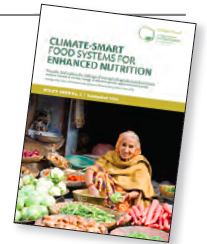Global Panel statement on climate change, food systems and nutrition
 “The Global Panel on Agriculture, Food Systems and Nutrition1 strongly believes that urgent policy action is needed to tackle the challenges that climate change poses to agriculture, nutrition, and human health.”
“The Global Panel on Agriculture, Food Systems and Nutrition1 strongly believes that urgent policy action is needed to tackle the challenges that climate change poses to agriculture, nutrition, and human health.”
Evidence shows that changing climate conditions will have important impacts on agricultural production and the quality of food and nutrition available to billions of people. In October 2015, the Global Panel released a brief entitled Climate Smart Food Systems for Enhanced Nutrition.
The Statement
- The Global Panel on Agriculture and Food Systems for Nutrition is concerned that in the past agriculture has not been afforded the priority that it deserves. Realising nutrition outcomes from effective climate smart agriculture will be essential for seeing progress towards the implementation of the Sustainable Development Goals (SDGs).
- Climate change is expected to push down global farm output by 2% per decade between now and 2050. Demand for food is expected to rise substantially during that same period. All of us depend on the nutritious food produced by millions of farmers for our health and wellbeing. We will continue to do so even as drought, extreme weather conditions and temperature changes associated with climate change challenge the resilience of the agricultural sector.
- Good nutrition is a universal goal that lies at the heart of actions to resolve both undernutrition and diet-related chronic diseases. These complex nutrition challenges pose a huge burden for social and economic development. Countries whose agriculture is likely to be most negatively impacted by climate change are those that already have the highest burdens of undernutrition. Many of these countries are in Africa; the impacts of climate change are therefore likely to be highly significant for the continent.
- Action to reduce agriculture’s contribution to greenhouse gas (GHG) emissions is also imperative. The Panel welcomes country submissions of their Intended Nationally Determined Contributions (INDCs).
- Of the 156 parties that have submitted INDCs, only 24 refer to nutrition and fewer note the complementarity of nutrition policies and climate action.
The Global Panel make the following policy recommendations:
- Include diet quality goals with adaptation targets proposed for climate action.
- Diversify agricultural investments, factoring in the local realities of ecological sustainability and comparative advantage.
- Support greater food-system efficiency so that outputs per unit of water, energy, land and other inputs are optimised and the footprint of agriculture and non-farm activities are better managed to meet both food demand and higher-quality diets.
- Integrate measures to improve climate change resilience and the nutritional value of crop and livestock products along the value chain, from production to marketing.
- Protect the diet quality of the poor in the face of supply shocks and growing food demand through social protection, for example.
- Promote the generation and use of rigorous evidence on appropriate investments along food value chains which are resilient to climate change and deliver positive dietary outcomes and support improved nutrition.
References
1 The Global Panel is an independent group of influential experts with a commitment to tackling global challenges in food and nutrition security.

